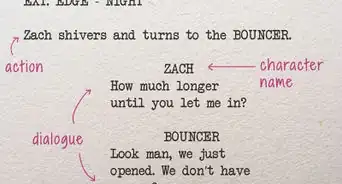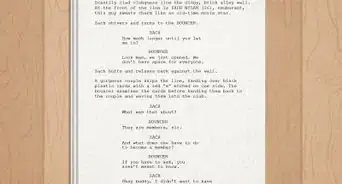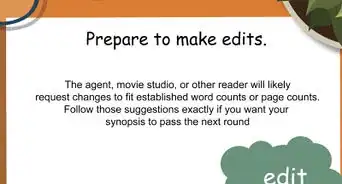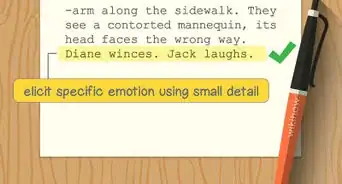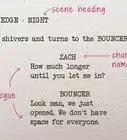This article was co-authored by Lucy V. Hay. Lucy V. Hay is a Professional Writer based in London, England. With over 20 years of industry experience, Lucy is an author, script editor, and award-winning blogger who helps other writers through writing workshops, courses, and her blog Bang2Write. Lucy is the producer of two British thrillers, and Bang2Write has appeared in the Top 100 round-ups for Writer’s Digest & The Write Life and is a UK Blog Awards Finalist and Feedspot’s #1 Screenwriting blog in the UK. She received a B.A. in Scriptwriting for Film & Television from Bournemouth University.
This article has been viewed 45,524 times.
A soap opera is a serial drama that focuses on multiple related characters, their lives, their hardships, and their emotional turmoil and growth. There are several different types of writers for soap operas, including the head writer who comes up with the entire story line for two years at a time, breakdown writers who come up with the story lines for individual weeks, and scriptwriters who come up with the dialogue for each day. Becoming a soap opera writer takes dedication, patience, and an ability to accept criticism, but it is possible to become a television writer if you have the talent, the determination, and a knack for writing.
Steps
Honing Your Craft
-
1Take writing classes. In order to be a professional writer, you have to have a good understanding of the language, but you also need to be able to write creatively. This means understanding plot lines, being able to bring characters to life, and being expressive with words. Moreover, writing for television is very different from other types of narrative writing, because you have to consider time constraints, commercial breaks, and other factors as well.[1]
- For writing classes, you can either go to school to earn a degree in creative writing or English, but look for a program that specializes in entertainment industry writing.
- If you don’t have the time or money for an entire degree, look for online classes or courses at a local college that you can take to help hone your art. Look for a creative writing course or a class that’s specific to television writing if possible.[2]
EXPERT TIPLucy V. Hay is a Professional Writer based in London, England. With over 20 years of industry experience, Lucy is an author, script editor, and award-winning blogger who helps other writers through writing workshops, courses, and her blog Bang2Write. Lucy is the producer of two British thrillers, and Bang2Write has appeared in the Top 100 round-ups for Writer’s Digest & The Write Life and is a UK Blog Awards Finalist and Feedspot’s #1 Screenwriting blog in the UK. She received a B.A. in Scriptwriting for Film & Television from Bournemouth University.Professional Writer
 Lucy V. Hay
Lucy V. Hay
Professional WriterAs you write, think about the concept behind the story, but also the structure and plotting. Also, consider the characters, like the function of their roles and their character motivation. That kind of thing comes with practice, and also from understanding the craft of writing and who your target audience is.
-
2Apply for a mentoring program. There may be no better way to learn how to write for television—and soap operas specifically—than to be taught or mentored by someone who has already done it. Some television stations offer mentoring or writing programs for aspiring writers, and will pair writers with staff writers, showrunners, and network executives.[3]Advertisement
-
3Write a few specs. Specs, which is short for speculative screenplays, are scripts that aspiring writers write in the hopes of landing jobs. To write a spec, choose a television show that you like and write an episode for it. When writing a spec, there are several things to remember, including:
- Be true to the format: make sure the length of your script matches the half-hour or hour-long nature of the show, work in commercial breaks, and write a proper television script.[4]
- Specs have to be original and innovative, but they also have to adhere to the nature of the show. Essentially, you want to write the episode as though you were actually a staff writer for that show. To do this, you'll need a good understanding of the show’s plot, characters, and tone.
- The purpose of a spec is to show employers that you can write, that you can tell a story, and that you understand the basic structure of a narrative (including putting scenes and acts together).[5]
- Once you’ve finished a spec, don’t be afraid to edit and tighten it up. Once you're happy with it, start another. Specs are like resumes in the TV writing industry, and a good spec can land you a job. You'll get better with each one you write, so don’t be discourage if nobody’s biting after your first or second spec.
EXPERT TIPLucy V. Hay is a Professional Writer based in London, England. With over 20 years of industry experience, Lucy is an author, script editor, and award-winning blogger who helps other writers through writing workshops, courses, and her blog Bang2Write. Lucy is the producer of two British thrillers, and Bang2Write has appeared in the Top 100 round-ups for Writer’s Digest & The Write Life and is a UK Blog Awards Finalist and Feedspot’s #1 Screenwriting blog in the UK. She received a B.A. in Scriptwriting for Film & Television from Bournemouth University.Professional Writer
 Lucy V. Hay
Lucy V. Hay
Professional WriterIf you want to write for soap operas, start by watching them. You have to understand how soap operas work in order to write for them, and you really need to be passionate about it. Don't write for soap operas because you just want to get a paycheck, or you'll get found out as a fraud. It's a huge industry—some of these soap operas are being watched by 10 to 16 million people.
-
4Write other material as well. While specs are important in the entertainment industry, they don’t interest everyone, and most people will want to see that you're a versatile writer who can work in other formats as well. And it’s not always specs that get writers hired: sometimes it can be a screenplay, short story, or other piece of writing that catches someone’s attention.
- The more you write the more you'll improve, and making it as a writer takes a lot of talent, finesse, and practice.
- In the entertainment industry, people are always trying to discover the next new thing, so aspire to write something innovative, creative, and interesting that will grab the attention of the people who read it. Try for things that are quirky, wacky, unconventional, and original.
Getting Hired
-
1Understand what's unique about soap operas. Soap are known for their over-the-top story lines that are still based in reality. Also, soap operas aren't designed to ever give viewers closure, and since the story line is always open-ended, most episodes end on a cliff hanger that’s designed to bring viewers back the next day. Some tropes that are common in soap operas include:[6]
- Characters often get pregnant when they aren't expecting to, especially if there's a one-night stand or an extramarital affair.
- Most of the characters are related somehow, even if they don’t know it.
- Characters, especially younger ones, often age much faster than everyone else.
- Characters who are killed off can still return, especially if the body wasn’t found.
EXPERT TIPLucy V. Hay is a Professional Writer based in London, England. With over 20 years of industry experience, Lucy is an author, script editor, and award-winning blogger who helps other writers through writing workshops, courses, and her blog Bang2Write. Lucy is the producer of two British thrillers, and Bang2Write has appeared in the Top 100 round-ups for Writer’s Digest & The Write Life and is a UK Blog Awards Finalist and Feedspot’s #1 Screenwriting blog in the UK. She received a B.A. in Scriptwriting for Film & Television from Bournemouth University.Professional Writer
 Lucy V. Hay
Lucy V. Hay
Professional WriterSoap operas involve a lot of moving parts, so you have to be flexible. Soap operas, or continuing dramas as we call them in the UK, are really a massive machine. They have to keep going year in and year out, and some soaps have 4 or 5 episodes a week. That means there are a huge amount of people involved at any one time. There's constant writing, rewriting, and storylining, then filming, editing, and distributing, so it's a lot of work.
-
2Enter writing contests. It doesn’t happen all the time, and it’s not a sure way to get discovered, but sometimes networks host writing contests for aspiring writers, While the prizes are often money, sometimes these contests can lead to opportunities with shows or networks, especially if your writing catches the eye of the right person. [7]
-
3Sell your work freelance. In entertainment writing, the first opportunity to make money in the business often comes from freelancing. These days, most of the scripts that are created for TV are written by staff writers and producers, but each series will also hire freelance writers throughout every season.
-
4Know your audience. Every TV show, including soap operas, has a bible that lays out the theme of the show, and writers and producers will use this bible as a guide when creating material. If you're trying to get work as a freelancer or staff writer for a particular show, you should study the bible so you know what kind of content they’ll be looking for.[8]
- When you know the bible for the show you're working on or trying to get a job with, you'll be able to pitch better ideas and write content that’s in line with the show’s themes and style.
- If you land an interview to write for a particular show, make sure you know the bible inside and out before going to the interview. This way, you'll be able to pitch better and more impressive ideas.
EXPERT TIPSome soap operas have a person whose job is to talk to the audience on social media about their reactions to each episode.
Lucy V. Hay is a Professional Writer based in London, England. With over 20 years of industry experience, Lucy is an author, script editor, and award-winning blogger who helps other writers through writing workshops, courses, and her blog Bang2Write. Lucy is the producer of two British thrillers, and Bang2Write has appeared in the Top 100 round-ups for Writer’s Digest & The Write Life and is a UK Blog Awards Finalist and Feedspot’s #1 Screenwriting blog in the UK. She received a B.A. in Scriptwriting for Film & Television from Bournemouth University.
Lucy V. Hay
Professional Writer Lucy V. Hay
Lucy V. Hay
Professional Writer -
5Get an agent. Anybody in the entertainment industry, including actors, musicians, and writers, can benefit from having an agent, because it’s the job of an agent to get jobs for clients. Moreover, many producers, executives, and showrunners are too busy to look at scripts that are sent in unsolicited, so an agent may be your only way to get a foot in the door.[9]
- When looking for agents, ask for referrals from people you know and trust. Agents are busy people too, but if you have a connection, you'll have a better chance of finding someone who will take you on.[10]
- If you're having trouble finding representation, check the agency list provided by the Writers Guild of America. From there, research a newer agent who specializes in the same kind of writing that you do, and send a query letter directly to that person.
-
6Don’t shy away from assistant jobs. Sometimes, getting into the entertainment industry as a writer means starting out somewhere else, and many people who are in the industry today began as assistants.
- Being an assistant will give you some great insight into the industry, and if you can land a job as a writer’s assistant, that’s even better. Not only can that person act as a mentor, but it will also help you build relationships and connections that could lead to a job down the road.[11]
- Assistant jobs can also lead to a promotion to staff writer, so if this is the route you want to go, try to get a job on a show you would like to write for. Showrunners or producers will be much more likely to hire somebody they know, and this is particularly true when you know the show and the characters inside and out.[12]
-
7Get your script into the right hands. Agent or no agent, the key to getting a job as a writer for a soap opera is to get samples of your writing into the right hands. This will be a lot easier if you have a job as an assistant or have an agent, but you can do it yourself with enough perseverance and some luck.
- Send your specs to as many people as you can: other writers, producers, showrunners, creators, or anyone else who might have the power to hire you. If you write a new spec or make some really great edits to an older one, send it out again.
- If anybody offers you constructive criticism, take it to heart. Listening to the opinions of people in the industry may just get you the advice you need to land a job.
- When you do send out your specs, make sure you follow up. This can be as simple as sending an email that says you sent your script and are looking forward to hearing back.
EXPERT TIPLucy V. Hay is a Professional Writer based in London, England. With over 20 years of industry experience, Lucy is an author, script editor, and award-winning blogger who helps other writers through writing workshops, courses, and her blog Bang2Write. Lucy is the producer of two British thrillers, and Bang2Write has appeared in the Top 100 round-ups for Writer’s Digest & The Write Life and is a UK Blog Awards Finalist and Feedspot’s #1 Screenwriting blog in the UK. She received a B.A. in Scriptwriting for Film & Television from Bournemouth University.Professional Writer
 Lucy V. Hay
Lucy V. Hay
Professional WriterIf you're hired, you'll have to write around the main storyline and any logistical concerns. In soap operas, storylines are often written weeks or even years in advance, and each episode is written around that storyline. There are also logistical things you have to work around. For example, if children are involved in your episode, you might have to write them out if they've already worked the maximum hours for that month. You might also have to rewrite a location if it's already being used for another scene. It's very difficult, but it's a really good training ground if you want to work in television.
Community Q&A
-
QuestionSo does that mean every scheme a character plots and does will never be revealed to the character’s victim?
 Tom De BackerTop AnswererNo. Many schemes are indeed revealed to the character in question. It's about milking it for as long as it will still give milk. And for the character to not know gives great (though clichéd) cliffhangers. Often, story lines or schemes will only be revealed either when it serves the plot of another story line or if there are so many other story lines already that this (old) one can finally be dropped.
Tom De BackerTop AnswererNo. Many schemes are indeed revealed to the character in question. It's about milking it for as long as it will still give milk. And for the character to not know gives great (though clichéd) cliffhangers. Often, story lines or schemes will only be revealed either when it serves the plot of another story line or if there are so many other story lines already that this (old) one can finally be dropped. -
QuestionWhy is it that some soap opera script writers decide not to reveal every scheme a character does later on in another story-line?
 Community AnswerThey do this to keep the viewers wanting more. It also allows for more content to be created and keeps the story intriguing and interesting.
Community AnswerThey do this to keep the viewers wanting more. It also allows for more content to be created and keeps the story intriguing and interesting.
References
- ↑ http://getinmedia.com/articles/film-tv-careers/how-land-your-first-tv-writing-job
- ↑ https://www.writersstore.com/breaking-into-television-writing/
- ↑ https://www.cbscorporation.com/diversity/diversity-institute/writers-mentoring-program/
- ↑ http://getinmedia.com/articles/film-tv-careers/how-land-your-first-tv-writing-job
- ↑ https://www.writersstore.com/breaking-into-television-writing/
- ↑ http://nycitywoman.com/features/my-life-writing-soaps
- ↑ http://opinionator.blogs.nytimes.com/2012/02/16/losing-all-my-children/
- ↑ http://nycitywoman.com/features/my-life-writing-soaps
- ↑ http://getinmedia.com/articles/film-tv-careers/how-land-your-first-tv-writing-job









-Step-5-Version-2.webp)


